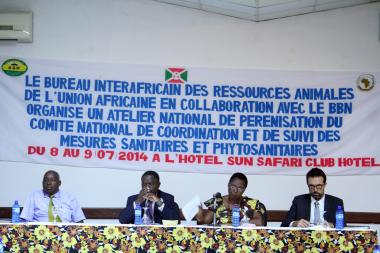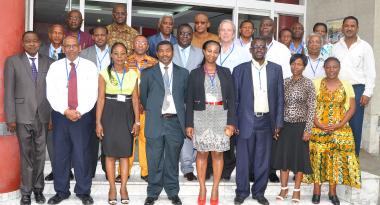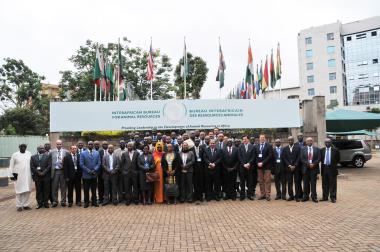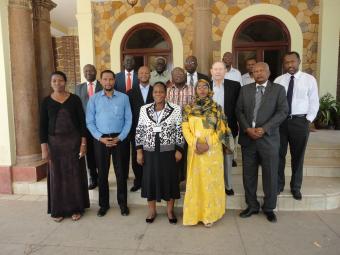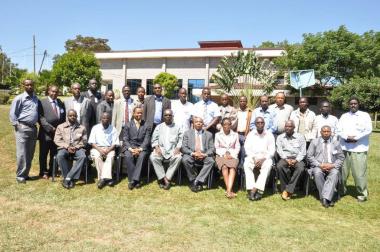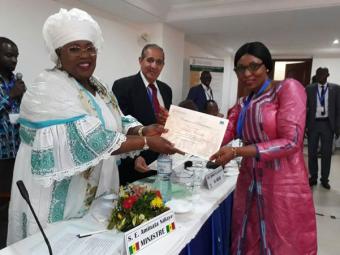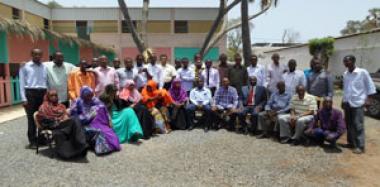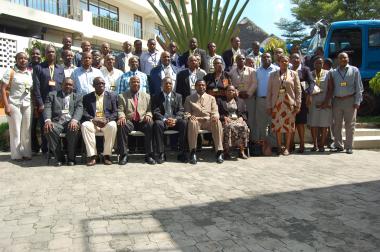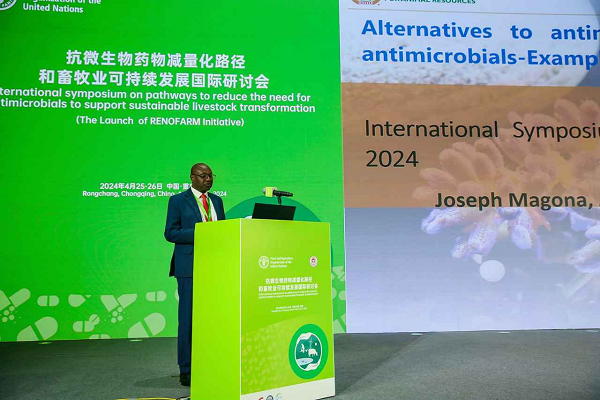
Chongqing, China, 25-26 April 2024
Chongqing, China, was the setting of a major event in the fight against antimicrobial resistance (AMR): The International Symposium on Pathways to Reduce the Need for Antimicrobials to Support Sustainable Livestock Transformation, more commonly known as RENOFARM. This symposium, which took place on April 25-26, 2024, brought together stakeholders, experts, and politicians from all around the globe to discuss the pressing problem of antibiotic usage in agriculture and how it affects people's health and the availability of food. Dr. Joseph Magona, who represents AU-IBAR as an expert on AMR, was an active participant in the conference. By taking part, AU-IBAR demonstrated its dedication to fighting antimicrobial resistance and promoting sustainable livestock practices among African Union member states.
Relevance of the Meeting in Realizing the Objectives of AUC and DARBE
A major danger to world health, food supply, and livelihoods is the development of microbes that are resistant to antimicrobials. A major factor hastening the emergence of AMR is the agricultural sector's excessive and inappropriate use of antimicrobials. Given the critical nature of the problem, the Food and Agriculture Organisation (FAO) convened the RENOFARM symposium to present the project, encourage participation, and pinpoint important approaches to put it into action. To better monitor, postpone emergence, restrict transmission, and lessen damage from AMR microbes, the symposium was in line with the goals of the African Union Commission (AUC) and the African Union Framework for Antimicrobial Resistance Control (2020-2025). The symposium enhanced the worldwide response to antimicrobial resistance (AMR) and promoted One Health concepts through collaborations with groups like AU-IBAR.
Background
Antimicrobial resistance is becoming an increasingly serious problem across Africa, especially in the agricultural sector. Pathogens that are resistant to antibiotics are a result of the overuse of these drugs in animal agriculture. News of extensive opposition throughout livestock value chains highlights the critical need for swift action. By highlighting effective health services, production methods, alternatives, incentives, and connections, the RENOFARM programme provides a holistic approach by promoting alternatives to the use of antimicrobials. Better farms, safer food products, more profitable enterprises, and a healthier environment are the goals of RENOFARM, which aims to revolutionise agrifood systems and reduce reliance on antibiotics.
Symposium Objectives and Outputs
The goals of the symposium were to introduce the RENOFARM initiative, encourage participation, facilitate the exchange of information, and pinpoint potential ways to put it into action. An improved knowledge of RENOFARM, the formal launch of the effort, and co-learning via information sharing were important outcomes. The significance of customised strategies for various livestock value chains was further emphasised at the symposium, which also brought attention to the priorities and difficulties encountered by African Union member states in executing RENOFARM.
Achievements of the Mission

Throughout the symposium, various sessions and presentations addressed critical issues related to reducing the need for antimicrobials. Topics ranged from EU One Health actions and biosecurity measures to national action plans and good production practices. Key achievements included the launch of the RENOFARM initiative, the exchange of country and regional priorities, and the issuance of the Rongchang Statement outlining future actions. Participants emphasized the importance of accelerating the implementation of national action plans, strengthening evidence-based policy-making, and promoting international collaboration.
AU-IBAR's Contribution to the Symposium - Presentation on Alternatives to Antimicrobials
During the Symposium, Dr. Joseph Magona, serving as AU-IBAR's AMR Expert, delivered a presentation titled "Alternatives to Antimicrobials to Reduce the Need for Antimicrobials - Examples from African Union Member States." His presentation provided valuable insights into the key pathways for implementing RENOFARM within African Union member states. Dr. Magona's expertise shed light on alternative strategies to mitigate antimicrobial use in various livestock value-chains, emphasizing the importance of good husbandry practices, vaccination, and biosecurity measures.
AU-IBAR's active involvement in the symposium facilitated knowledge exchange and collaboration among stakeholders. By showcasing the status of AMR National Action Plans and prioritized target value-chains for AMR surveillance in African countries, AU-IBAR provided valuable data for understanding the regional landscape of antimicrobial resistance. Additionally, AU-IBAR's presentation highlighted the diverse approaches and challenges faced by African nations in implementing alternative measures to reduce antimicrobial usage in livestock production.
Conclusion
The International Symposium on RENOFARM represented a significant advancement in the global fight against antimicrobial resistance. By bringing together stakeholders from various backgrounds, the symposium facilitated collaboration, exchanged expertise, and outlined tangible ways to address this critical problem. As countries and regions battle with the difficulties of AMR, efforts such as RENOFARM provide promise for a sustainable future in which antimicrobials are used responsibly while protecting the health of humans, animals, and the environment.
The participation of AU-IBAR, represented by Dr. Joseph Magona, demonstrates the organization's commitment to combating AMR and supporting sustainable livestock practices in Africa. AU-IBAR makes major contributions to the global fight against antimicrobial resistance by working collaboratively and sharing knowledge, safeguarding the health and well-being of both animals and humans on the African continent.
The journey to sustainable livestock transformation has begun, and the momentum generated by the symposium will help us get closer to our goals. As we move forward, let us remain committed to the ideas of One Health and collective action, understanding that only teamwork will help us overcome the difficulties posed by antimicrobial resistance.

